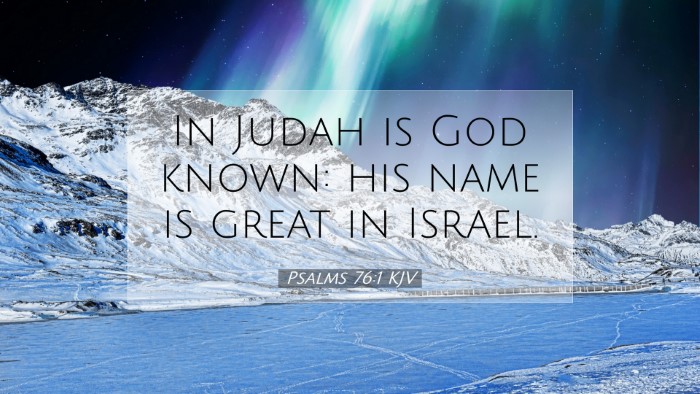Psalms 76:1 - Commentary Summary
Verse: "In Judah is God known: his name is great in Israel."
Introduction
The opening verse of Psalm 76 encapsulates key theological themes related to God's revelation and His sovereignty among His people. The declaration that God is known in Judah and that His name is great in Israel invites contemplation on God's relationship with His chosen people. This commentary seeks to unravel the layers of meaning present in this verse through insights derived from notable public domain commentaries.
The Theological Significance of Divine Revelation
Matthew Henry emphasizes that the knowledge of God is a profound blessing granted to the faithful. He writes that being known by God in Judah signifies a rich relationship characterized by covenant faithfulness.
“In Judah is God known” suggests that God has revealed Himself to His people in a special way, bestowing upon them both wisdom and understanding of His nature and attributes. This relationship is not merely a recognition but an experiential knowledge that transforms lives and shapes community identity.
Judah: A Symbol of God's Choice
Albert Barnes notes that Judah represents the place where God chose to manifest His glory and presence. He states:
“Judah is particularly associated with the tribe from which the Messiah came.” This is significant as it connects the promise of God with the lineage of Jesus Christ, thereby rooting our understanding of God's revelation in the historical and redemptive plan of salvation.
Additionally, Barnes points out the geographical and spiritual implications, suggesting that Judah's role as a center for God's knowness places it as a beacon of hope for all nations. He reminds readers that God’s greatness is not inhibited by boundaries; rather, it transcends limitations and is available to all who seek Him.
The Greatness of God's Name
Adam Clarke reflects on the phrase “his name is great in Israel”, elucidating that a name in biblical times encapsulated the character and reputation of an individual. For Clarke, God’s name embodies His power, holiness, and redeeming love displayed throughout Israel's history.
This greatness is declared through Israel’s historical events where God has demonstrated His might—such as the Exodus and the establishment of the monarchy. Clarke argues that acknowledging God's greatness is integral to genuine worship and obedience. The proclamation of God's name signifies not just reverence but also a call to recognize the attributes that make Him worthy of such adoration.
Cultivating Knowledge of God Among His People
Drawing from the insights of Henry, it is evident that God's self-revelation invites a response from His people. Knowledge of God, as emphasized here, compels an acknowledgment of His sovereignty and our subsequent duty to live according to His precepts.
- Worship: True worship flows from an understanding of who God is—acknowledging His greatness ensures that worship is grounded in sincerity and truth.
- Evangelism: With knowledge comes responsibility; believers are called to share this revelation with others, reflecting God’s love and grace to the world.
Implications for Community Identity
The unity of Judah and Israel under the acknowledgment of God fosters a strong communal identity. Matthew Henry warns against the dangers of forgetfulness regarding God’s sovereignty, suggesting that a neglect of God’s greatness leads to moral and spiritual decline.
Conversely, when the community collectively recognizes and declares God's greatness, powerful transformation occurs. Barnes suggests that a collective remembrance of God’s deeds enables communities to stand firm against adversities, drawing strength from their shared heritage.
Conclusion
Psalms 76:1 serves as a clarion call to recognize and engage with God’s self-revelation. It invites all—pastors, students, theologians, and scholars—to reflect deeply on the nature of God and His relationship with His people.
As articulated in the commentaries, the interplay between knowledge of God and communal identity is vital for spiritual vitality. The verse challenges believers not only to know God but to make Him known, proclaiming His greatness in worship, evangelism, and daily life.


